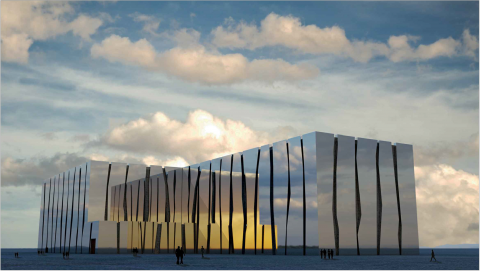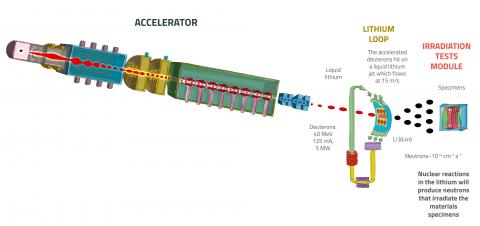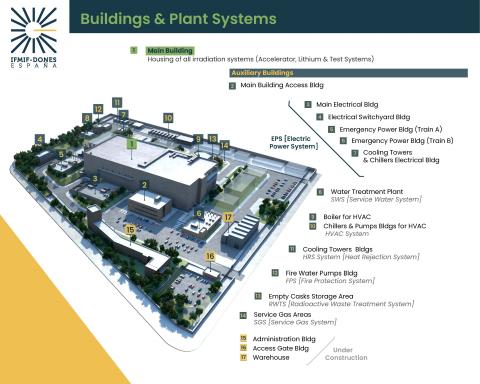



General information
-
Hosting OrganisationConsorcio IFMIF-DONES España
-
AddressPalacio de Quinta Alegre, Av. de Cervantes, 27, 18008 Granada
-
Contact Info:
-
Phone
-
Emailcontact@ifmif-dones.es
Description
The use of energy, extracted from different sources, is essential for our survival. However, current energy sources are not enough for a planet that has abused of its natural resources to unsustainable limits, for the sake of development and progress. This is the reason why we are facing the great scientific and technological challenge of looking at the sun trying to replicate its fusion processes and make them possible in a controlled way here on earth as a way to find a practically unlimited source of energy that is environmentally-friendly, this is the fusion energy.
The development of materials capable of withstanding high neutron fluxes in fusion energy is a significant challenge. The European Fusion Roadmap (2018) identifies the creation of IFMIF-DONES to address this need. The European IFMIF-DONES Facility is the central element of the DONES Programme, which aims to establish an extensive database on fusion materials.
EURATOM, together with several European countries, has been supporting the preparation for IFMIF-DONES; first, in collaboration with Japan, through the IFMIF-EVEDA project initiated in 2007 and implemented by the European Joint Undertaking for ITER and the Development of Fusion Energy (F4E) and, second, since 2015, through the EUROfusion Consortium that develops the advanced engineering design of IFMIF-DONES. Since 2018, the preparation of IFMIF-DONES is carried also out under the ESFRI (European Strategy Forum on Research Infrastructures) framework.
After F4E issuing a call for proposals in 2016, the Region of Granada in Spain was selected to host and build the IFMIF-DONES facility in Europe, as proposed jointly by Spain and Croatia. The proposal received approval from the F4E Governing Board and the Council of Ministers of the EU in December 2017 and April 2018, respectively, emphasizing the need to maintain successful cooperation with Japan within the Broader Approach.
On 16 March 2023 the first DONES Steering Committee in Granada was held in Granada, the highest governing body of the DONES Programme, and agreed, among others, to start of the construction phase of the IFMIF-DONES Facility in Escúzar (Granada).
𝗜𝗙𝗠𝗜𝗙-𝗗𝗢𝗡𝗘𝗦 𝗙𝗮𝗰𝗶𝗹𝗶𝘁𝘆 𝗠𝗶𝘀𝘀𝗶𝗼𝗻
The IFMIF-DONES Facility is defined to provide an accelerator-based D-Li neutron source to produce high energy neutrons at sufficient intensity and irradiation volume to simulate as closely as possible the first wall neutron spectrum of future nuclear fusion reactors. The IFMIF-DONES Facility (“The Facility”) should then be understood as the set of Buildings and Systems that will become the fusion relevant neutron source and that will help to fulfil the objectives of the DONES Programme.
The accelerator facility will produce a 125 mA deuteron beam, accelerated up to 40 MeV and shaped to have a nominal cross section in the range from 100 mm x 50 mm to 200 mm x 50 mm. The beam will impinge on a liquid lithium curtain 25 mm thick and cross-flowing at about 15 m/s. The stripping reactions will generate a large number of neutrons which will interact with the materials samples located immediately behind the lithium curtain, in the Test Modules.
Main equipment or Facilities
- Accelerator Systems
- Lithium Systems
- Test Systems
- Buildings and Plant Systems
- Instrumentation and Control Systems
Projects under Development
- IFMIF-DONES Facility: Buildings and Plant Systems, Accelerator Systems, Lithium Systems, Test Systems, Instrumentation and Control Systems).
- EUROfusion Workpackage WPENS (Work Package Early Neutron Source).
- DONES Consolidation Phase funded by the European Commission (DONES-ConP1).
- Innovation Pre-commercial Public Procurement contracts for developing systems and materials validators in fusion energy (VATIAC and VATIST), CDTI.
- Innovation projects with industry: NEURON DONES, E4XTREM, OPTIMA-DONES.
Technology Capabilities
- Basic material technologies and advanced manufacturing techniques
- Complex building, constructions, and safety related systems
- Cryogenics, vacuum, and leak detection technologies
- Diagnostics, detectors, sensors, optics, and instruments
- Electrical, power electronics, electromechanical and RF systems
- High precision and large mechanical components
- Information and communication technologies
- Instrumentation, control and CODAC
- Remote handling systems
- Superconductivity and superconducting magnets
Summary of Research Services
One of the key challenges in the realization of fusion energy is the development of neutron tolerant materials that can withstand a flux of neutrons up to 14 MeV while maintaining adequate structural and other physical properties over long periods. Currently, engineering material data, both properties and rules, are based on fission neutron irradiation campaigns, not fully covering the neutron energies, temperature and other operational conditions.
To test materials, and produce this knowledge, it is therefore necessary to develop a fusion material neutron source with a fusion-like neutron spectrum. The International Fusion Materials Irradiation Facility or IFMIF, will provide a fusion-spectrum device for fusion material testing at high neutron doses, being the only alternative considered technically feasible to address this issue. The conceptual design of this facility was developed in the framework of an international collaboration up to 2004 and was designed to fulfil the needs of future fusion reactors. A simplified version focused on DEMO needs, known as IFMIF-DONES (DEMO-oriented Neutron Source), was agreed in 2014 as the European reference and integrated into an overall strategy to develop fusion material testing including fission and fusion-like irradiations.
The IFMIF-DONES facility could be also used by other (i.e. non-fusion) scientific communities, such as health-related (mainly for isotopes production), basic physics (astrophysics, solid state physics) or nuclear physics. It can also provide some unique technological-related services for industry.
For more information: https://ifmif-dones.es/dones-users-2/
Procurement process
The contributions to the DONES Programme from the Parties will take the form of in-kind contributions.
Any acquisition of goods or services is made in accordance with the following rules:
- The different in-kind contributions of the Parties will be channeled through Implementing Agencies (IA).
- Consequently, the Implementing Agencies (IA) will manage the tender process for the in-kind contribution in compliance with their own financial regulation.
For more information: https://ifmif-dones.es/dones-programme/members/